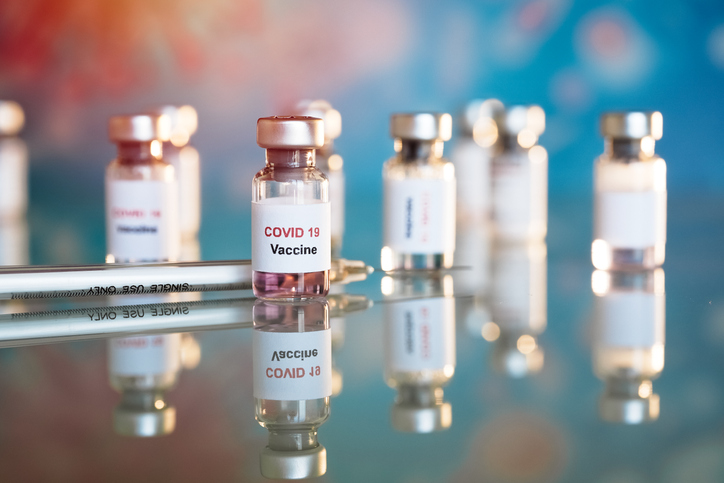A rare blood clotting disorder linked to the AstraZeneca COVID-19 vaccine has thrown a spanner in the slow-moving wheel of Australia’s rollout. We break down the emerging research about health risks for different age groups.
Australia’s vaccine rollout is looking more like a slow spooling disaster, as fears over the safety of the AstraZeneca vaccine have snowballed in recent weeks.
The Australian Government in April scrapped the AstraZeneca shot as the preferred vaccine for adults under 50, after the European Medicines Agency linked the shot to rare cases of blood clotting and low blood platelet count in patients around Europe. In the week this magazine went to print, the rollout screeched to a tragic halt when a 48-year-old NSW woman died from developing rare blood clots, just days after receiving the AstraZeneca jab.
The resulting media hysteria has been alarming and confusing. What is this rare blood clotting illness and what could it do to you? Perhaps more pressing: what is the likelihood you will fall severely ill – from either COVID-19 or the vaccine designed to prevent it?
The research
The European Medicines Agency issued the first warnings about the AstraZeneca jab after investigating 86 clotting cases, 18 of which were fatal, out of 25 million people who received the vaccine. Most of the cases were in women aged under 60.
The Australian Technical Advisory Group on Immunisation (ATAGI) explains the blood clotting condition as follows: “thrombosis with thrombocytopenia syndrome (TTS) is a rare and new syndrome which has been reported after being given the AstraZeneca COVID-19 vaccine … The condition involves blood clots (occurring in body sites like the brain or abdomen) together with low platelet levels.”
“Studies have suggested it may occur in approximately four to six people in every one million people in the four to 20 days after the first dose of vaccine. However, higher rates have been reported in Germany and some Scandinavian countries,” says the statement.
Comparatively, the World Health Organization says one in five people infected with COVID-19 experiences severe symptoms. One in 20 has not recovered. At the time of writing, three million people globally have died from COVID-19.
In Australia, where community spread of COVID-19 is almost non-existent, the risk of catching COVID-19 or developing severe disease is far lower. We’re in a unique position to be able to refuse one type of vaccine and maintain very low risk of catching COVID-19 – for now.
What’s the advice (and why) for under-50s?
Medical experts agree that TTS is a “rare but serious” side effect of taking the AstraZeneca vaccine. Rare means very rare: just two cases have been reported in Australia among more than one million AstraZeneca vaccines distributed. However, serious means quite serious: of those who develop the clots associated with the AstraZeneca shot, 25 per cent will die, according to Chief Medical Officer Paul Kelly.
On the other hand, COVID-19 is common, but less serious, for people under 50. Of the 909 COVID-19 deaths reported in Australia, only five were in people aged 49 or under. In other words, 99.5 per cent of Australian COVID-19 deaths were in people 50 and older. It’s why Australian authorities are recommending people under 50 avoid the AstraZeneca jab for now. With such a low risk of catching COVID-19 in Australia, or developing severe disease, it may be better for them to wait for a Pfizer or alternative vaccine to become available.
There has been speculation that the contraceptive pill – which millions of women take daily – can also cause the rare blood clots. In that case, why any extra worry about the vaccine?
As University of NSW lecturer Terri Foran explained to SBS, about five to 12 women out of every 10,000 who take the contraceptive pill are affected by clots – which seem to be less severe than the AstraZeneca-induced clots. However, clotting also affects three to five out of every 10,000 women of reproductive age who don’t take the pill.
“The difference is that with the pill, you’ve only got about a 3 per cent chance of dying [if you get a clot] so it’s tragic if it happens, but the actual risk of dying is still very small,” Dr Foran told SBS News.
What’s the advice (and why) for over-50s?
Anyone aged over 50 is most likely to receive the AstraZeneca vaccine, which is being manufactured on our shores with a Federal Government order for more than 50 million doses. Those in this age group may feel uncertain or even scared rolling up their sleeve for AstraZeneca: if people younger and presumably healthier are being advised against AstraZeneca, why risk it? Especially while community transmission in Australia is virtually non-existent?
Australian Chief Medical Officer Paul Kelly has explained the risks of contracting COVID-19 in the older age group far outweigh the TSS risk stemming from the vaccine. He also added that it is precisely the strong immune systems of younger people that could be increasing their chances of contracting TTS. The rare syndrome is likely stimulated by an over-enthusiastic immune response, and therefore has a greater chance of affecting young people with “robust” immune systems.
“[The advice that over-50s should continue to be vaccinated with AstraZeneca] is based both on the increased risk of complications from COVID-19 with increasing age, and thus increased benefit of the vaccination, and the potentially lower – but not zero – risk of this rare event with increasing age,” Kelly said last month following the updated health advice.
The Australian Medical Association’s advice is, when in doubt, avoid social media hysteria and statistic shopping in favour of a traditional chat with your doctor.
“Your GP will give you the best advice about any medicine or vaccine. They will offer you what they believe to be of medical benefit to you and explain any risks and benefits of having or not having the treatment,” AMA President Dr Omar Khorsid said.




